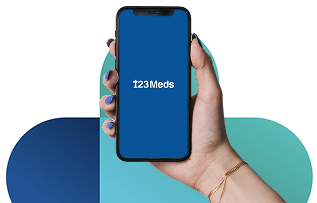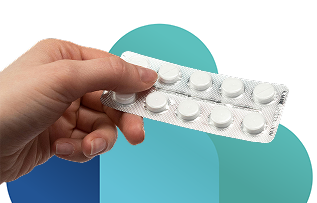Gout
Gout is a type of arthritis that can cause sudden, intense joint pain, swelling, and redness. While flare-ups can be distressing, effective treatments can reduce pain, manage inflammation, and help prevent future attacks.
Our range of medications can help manage the symptoms of acute gout attacks.
Through 123Meds, you can receive expert-approved treatments for gout via our UK-registered online pharmacy service, with prescriptions reviewed by clinicians and delivered discreetly straight to your door.

pharmacists

consultations & orders

delivery before 3:30PM

Available Now
.
Gout is a type of arthritis that causes sudden, painful attacks of joint inflammation. It happens when uric acid builds up in the blood and forms sharp crystals in the joints. These crystals trigger intense pain, swelling, redness, and heat in the affected area. Gout most commonly affects the big toe, but it can also involve the ankles, knees, wrists, fingers, or elbows.
Uric acid is a waste product made when the body breaks down substances called purines, which are found in certain foods and drinks as well as in our own cells. Normally, uric acid is removed by the kidneys, but if too much builds up it can form crystals in the joints.
Factors that increase the risk of gout include being overweight, drinking alcohol (especially beer and spirits), eating foods rich in purines such as red meat or seafood, certain medicines like diuretics, and a family history of gout.
A gout attack usually comes on suddenly, often at night. The affected joint becomes very painful, swollen, red, and warm to the touch. Even light pressure, such as from bedsheets, can feel unbearable.
Symptoms usually peak within 12 to 24 hours and can last for several days or even weeks if untreated. Between attacks, some people have no symptoms, while others may experience ongoing joint stiffness or discomfort.
You should seek urgent medical advice if you have a high fever, shaking chills, or if the joint is extremely hot, swollen, and painful, as this could be a sign of a joint infection rather than gout.
The aim of treatment is to reduce pain and inflammation during an acute gout attack. Anti-inflammatory medicines such as naproxen are commonly used to bring down swelling and ease pain. Another option is colchicine, which helps to reduce inflammation by interfering with how uric acid crystals trigger the immune system. Our service provides treatment with naproxen or colchicine for adults with uncomplicated gout flares.
Alongside medicines, lifestyle changes can make a difference. Resting and raising the affected joint can ease discomfort, and applying an ice pack may help reduce swelling. Longer-term, maintaining a healthy weight, drinking plenty of water, limiting alcohol, and reducing purine-rich foods can lower the risk of future attacks.
Always read the patient information leaflet that comes with your medicine, and follow the instructions carefully. If your symptoms do not improve within a few days, or if attacks become more frequent, you should speak with your GP. Preventative medicines to lower uric acid levels, such as allopurinol, may be needed for people with recurrent gout.
If you develop severe pain with fever, chills, or feel very unwell, you should seek urgent help through NHS 111, your GP, or A&E.
What is gout?
Gout is a type of arthritis caused by a build-up of uric acid in the blood. When uric acid levels become too high, sharp crystals can form in the joints, leading to sudden attacks of severe pain, swelling, and redness.
What are the symptoms of gout?
Gout usually affects one joint at a time, most commonly the big toe, although it can also affect the ankles, knees, wrists, fingers, or elbows. Symptoms include intense joint pain, swelling, redness, warmth, and tenderness. The pain often comes on suddenly, especially at night, and may last for several days.
What triggers a gout attack?
Gout attacks can be triggered by factors that raise uric acid levels, such as eating red meat, shellfish, or foods high in purines, drinking alcohol (especially beer or spirits), dehydration, or certain medications. Stress, illness, or injury can also trigger an attack.
How is gout treated?
Treatment for gout usually involves anti-inflammatory medicines such as NSAIDs (ibuprofen, naproxen), colchicine, or corticosteroids to reduce pain and swelling during an attack. For people who experience recurrent gout, long-term medicines such as allopurinol may be prescribed by your GP to lower uric acid levels and prevent future attacks. Our clinicians can advise on the best treatment for you.
Can gout be prevented?
You can help reduce the risk of gout attacks by maintaining a healthy weight, staying well hydrated, limiting alcohol, and reducing foods high in purines such as red meat and seafood. Regular exercise and managing underlying conditions like high blood pressure, diabetes, or kidney disease also help prevent flare-ups.
Fill out a quick form!
Fast, safe online consultations – no need to visit a GP or pharmacy.

Select your medication
Once you’ve completed the assessment, we’ll show you treatments that are right for you.

Prescriber review
Our prescribers will review your consultation and, if it's right for you, send a prescription to our pharmacy.

Express Delivery
Discreet delivery straight to your door, as soon as the next day.

Our 5-Point Safety Guarantee
We focus on trust, privacy, and expert service in online medication ordering.
GPHC and MHRA Regulated Pharmacy
Regulated by all necessary UK regulatory bodies
UK qualified Pharmacists
All consultations reviewed by UK pharmacists
Authentic Medication
Sourced from approved suppliers only
Customer Care
Customer care team available via email or phone
Trusted by Thousands
Thousands of satisfied customers

pharmacists

consultations & orders

delivery before 3:30PM

Available Now

